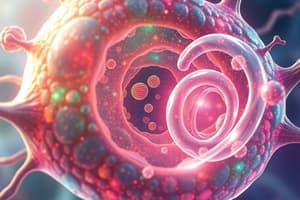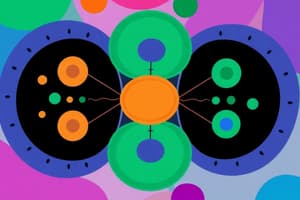Podcast
Questions and Answers
What is the first postulate of the Cell Theory?
What is the first postulate of the Cell Theory?
Which scientist established that all animals are composed of cells?
Which scientist established that all animals are composed of cells?
Who discovered cells in 1665 by examining cork?
Who discovered cells in 1665 by examining cork?
What theory did the third postulate of Cell Theory disprove?
What theory did the third postulate of Cell Theory disprove?
Signup and view all the answers
Which of the following individuals contributed to the development of the modern microscope?
Which of the following individuals contributed to the development of the modern microscope?
Signup and view all the answers
What did Leeuwenhoek observe that indicated the presence of live bacteria?
What did Leeuwenhoek observe that indicated the presence of live bacteria?
Signup and view all the answers
What evidence did Hooke use to conclude a cell's death?
What evidence did Hooke use to conclude a cell's death?
Signup and view all the answers
What was the primary finding of Matthias Jacob Schleiden regarding plant specimens?
What was the primary finding of Matthias Jacob Schleiden regarding plant specimens?
Signup and view all the answers
What is the role of the cell membrane?
What is the role of the cell membrane?
Signup and view all the answers
What are the major parts of the cell?
What are the major parts of the cell?
Signup and view all the answers
What is the composition of the cell membrane?
What is the composition of the cell membrane?
Signup and view all the answers
Polar substances can cross the cell membrane independently.
Polar substances can cross the cell membrane independently.
Signup and view all the answers
What is primarily found in the cytoplasm?
What is primarily found in the cytoplasm?
Signup and view all the answers
What is the role of the cytoplasm?
What is the role of the cytoplasm?
Signup and view all the answers
What is the function of the nucleus?
What is the function of the nucleus?
Signup and view all the answers
What is contained within the nucleus?
What is contained within the nucleus?
Signup and view all the answers
What is the main function of the endoplasmic reticulum?
What is the main function of the endoplasmic reticulum?
Signup and view all the answers
Which type of endoplasmic reticulum synthesizes proteins?
Which type of endoplasmic reticulum synthesizes proteins?
Signup and view all the answers
What are ribosomes involved in?
What are ribosomes involved in?
Signup and view all the answers
Lysosomes are known as the cell's 'suicide bags'.
Lysosomes are known as the cell's 'suicide bags'.
Signup and view all the answers
What do peroxisomes break down?
What do peroxisomes break down?
Signup and view all the answers
Which organelle is known as the powerhouse of the cell?
Which organelle is known as the powerhouse of the cell?
Signup and view all the answers
What is the main energy currency produced by mitochondria?
What is the main energy currency produced by mitochondria?
Signup and view all the answers
Study Notes
Cell Theory - Basic Principles of Biology
- British scientist Robert Hooke discovered cells in 1665 while examining a piece of cork.
- He observed small structures that he compared to "cellulae" (little rooms).
- Cell Theory was developed in the mid-1800s.
Cell Theory - First Postulate
- "The cell is the basic unit of life"
- All living organisms are made up of at least one cell.
- Unicellular organisms, like bacteria, consist of a single cell.
- Multicellular organisms, like animals, consist of many cells.
- The movement of organelles within a cell is a sign of life.
- Dissipation of the cell's protoplasm indicates death.
Cell Theory - Second Postulate
- "All living organisms are composed of cells"
- This postulate was a collaboration between Matthias Jacob Schleiden (botanist) and Theodor Schwann (physiologist).
- Schleiden established that plant specimens are composed of cells in 1838.
- Schwann correlated his findings with Schleiden's and concluded that animals are also composed of cells.
Cell Theory - Third Postulate
- "New cells are created from pre-existing cells"
- Cells can only be formed through the union of male and female cells or the division of a single cell.
- This disproved the theory of spontaneous generation, which proposed that living things could arise from non-living matter.
Development of Cell Theory
- 1590: Zacharias Janssen, with the help of his father Hans, invented a primitive microscope.
- 1663-1665: Robert Hooke observed thin slices of cork and identified "cells".
- 1665-1676: Marcello Malpighi and Nehemiah Grew made significant contributions to the understanding of plant cells.
- 1670-1683: Anton van Leeuwenhoek improved upon Janssen's microscope, creating lenses that could magnify objects up to 270 times their size. He observed and documented "animalcules" (microorganisms) in various samples.
Cell Membrane
- Outermost layer of the cell.
- Protects the cell and its contents.
- Controls the exchange of essential components.
- Composed of a phospholipid bilayer (double layer of fats and proteins).
- Phospholipid is a prominent type of lipid molecule present in the plasma membrane.
- Controls the materials' entry and exit from the cell.
- Lipids such as cholesterol can pass through the membrane because of its hydrophobic interior.
- Polar substances cannot cross the membrane independently as they cannot penetrate the membrane's hydrophobic interior.
Cytoplasm
- Area within the cell where organelles are located.
- Primarily composed of water, proteins, and salts.
- Organelles are suspended in a gel-like solution called cytosol, composed of compounds such as water and ions of sodium, potassium, and calcium.
- Contains enzymes that break down waste and enable metabolic reactions.
- Accommodates essential activities that allow for cellular expansion and growth.
- Together with the cytoskeleton, it determines cell shape and accommodates movement for some cell types.
Nucleus
- The "control center" of a cell.
- Directs all the cell's activities.
- Determines how a cell should appear and function.
- Takes up about 10% of the cell's volume.
- Contains the nucleolus, the site of ribosome synthesis.
- Holds the chromosomes, which carry the tightly wrapped and coiled DNA (deoxyribonucleic acid), the genetic material of an organism.
Endomembrane System
- A network of structures involved in various functions, such as ensuring adaptation, wrapping, and transferring proteins across the cell.
- Functions as a depository of nutrients and a disintegrator of harmful organisms.
Endoplasmic Reticulum
- Transports molecules across the cytoplasm.
- Assembles new lipids for export to other cell membranes.
Rough or granular ER
- Synthesizes and modifies proteins.
- Significant in the formation of plasma membrane proteins and proteins outside the cell.
- Has a rough appearance due to the ribosomes attached to it.
Smooth or agranular ER
- Incorporates proteins into the cisternae.
- Transports synthesized proteins across the cytoplasm.
- Involved in synthesizing fatty acids and phospholipids..
- Abundant in liver cells, where it detoxifies hydrophobic chemicals.
Ribosomes
- Involved in providing a frame for protein synthesis; they are sites of protein production.
- Discovered by G.E.Palade in 1952.
- Present in prokaryotic and eukaryotic cells.
Vacuoles
- Fluid-filled vesicles enclosed by a membrane.
- Have a selective membrane that allows water passage but retains smaller molecules within it.
- Stores chemicals within the cells.
- Acidic environment.
Lysosomes
- Serve as digestion slots for cellular materials that are due for expiration or are no longer useful.
- Cell's "suicide bags" because they are capable of self-destruction to save other organelles from being poisoned.
Peroxisomes
- Disintegrate proteins.
- Accommodate the breakdown of fatty acids.
- Shield the cell from serious damage caused by reactive oxygen species (ROS) molecules.
- ROS molecules are by-products of normal cellular metabolism.
Golgi Apparatus
- Observed as stalks of flat frameworks holding several sacs of secretory granules.
- Functions as the manufacturer and shipping center of the cell.
- Modifies, sorts, and packages the macromolecules synthesized by the cells.
Centrosomes
- Assist in arranging microtubules (hollow tubes of protein) for use during cell division.
- Enable microtubules to form part of the cell's cytoskeleton.
- Help maintain cellular shape and stabilize cell structure.
Mitochondria
- The "animal cell's powerhouse."
- Primarily involved in producing energy through cellular respiration.
- Responsible for the production of adenosine triphosphate (ATP), the cell's energy currency.
- Fill up about 25% of the volume of the cell.
Studying That Suits You
Use AI to generate personalized quizzes and flashcards to suit your learning preferences.
Description
Explore the foundational concepts of Cell Theory, which includes the pivotal historical discoveries by Robert Hooke and the principles established in the mid-1800s. Understand the two main postulates of Cell Theory and their significance in biology. Join us to deepen your knowledge of cellular structures and functions.




